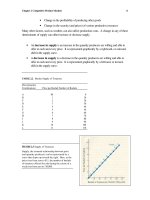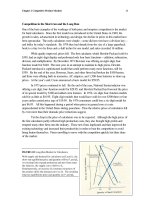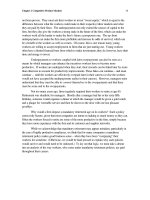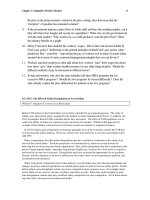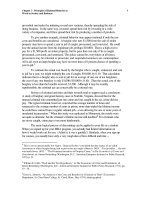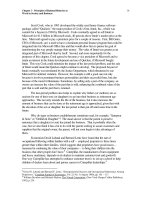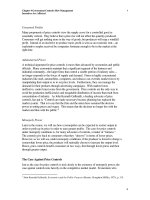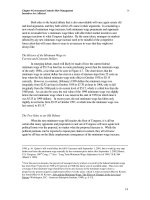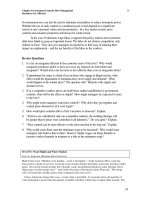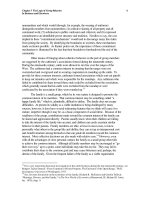Tài liệu Microeconomics for MBAs 57 pdf
Bạn đang xem bản rút gọn của tài liệu. Xem và tải ngay bản đầy đủ của tài liệu tại đây (44.06 KB, 10 trang )
Chapter 16 Public Choice: Politics in
Government and the Workplace
19
• As the diversity within a decision-making unit increases (more disciplines
included with more divergent views on how analyses should be organized and
pursued), the demand for tenure will increase.
• Should universities become more constrained in their capacities to fund
established faculty positions, tenure may be perceived as even more valuable.
Financial exigencies can translate into the loss of faculty positions (with non-
tenured positions becoming prime targets), so it should not be surprising that
faculty will seek with greater diligence to redistribute remaining positions and
rents. It also means universities will probably have to spend considerable
resources seeking to instill academic values -- not the least of which will be the
pursuit of honest dealings and academic excellence. This emphasis may cause
faculty members to shun an important incentive inherent in the political process
(especially in large group settings), that is, the tendency to pursue strictly private
objectives at the expense of larger university goals.
11
Why Business People Don’t Have Tenure
If professors have tenure, why don’t business people have provision for the same kind of
job security? The quick answer to that question is that businesses, unlike universities,
typically are not labor managed. (Those that are like universities should be expected to
use some form of tenure.) As noted, in business, goals are usually well defined. Perhaps
more importantly, success can usually be identified with relative ease by using an
agreed-upon measure, that is, profit (or the expected profit stream captured in the market
prices of traded securities). The owners, who are residual claimants, have an interest in
maintaining the firm’s focus on profits. Moreover, people who work for businesses tend
to have a stake in honest evaluations of potential employees, given that their decisions on
“better” recruits can increase the firm’s profits and the incomes and job security of all
parties.
Admittedly, real-world businesses do not always adhere to the process as
described. They use, to a greater or lesser degree, participatory forms of management,
and for some businesses, profit is not always the sole or highest priority goal. “Office
politics” is a nontrivial concern in many firms. The point is, however, that in business
there is not as great a need for tenure as exists within academe; employees in businesses
do not have the incentive to demand tenure that professors have, primarily because these
employees do not experience the problems inherent in democratic management that
derive from imprecise and shifting goals and from esoteric and ill-defined research
projects. Tenure is seldom found in firms, for the simple reason that in business,
employers and employees cannot make mutually beneficial trades (similar to those made
in tenure arrangements).
Now, let’s suppose that political institutions and problems were as well
entrenched in a firm as they are in academe, to the point of significantly undercutting
11
As Miller (1992) has shown, the benefits of “corporate organization” eventually break down when the
parties follow completely rational, individualistic precepts [Gary J. Miller, Managerial Dilemmas: The
Political Economy of Hierarchy (New York: Cambridge University Press, 1992)].
Chapter 16 Public Choice: Politics in
Government and the Workplace
20
firm profits. What would happen? Clearly, some smart coalition of managers or outside
investors would see a potential for increasing their wealth. They would buy the firm’s
stock at a low price depressed by the political encumbrances and reform management
practices, suppressing the power of destructive politics and refocusing the managers’ and
workers’ attention on the bottom line. They would clarify the extent to which the
workers’ long-run gains would be a function of their contributions to profits. The price
of the stock could then rise. Voila! The takeover investors would have a wealth increase,
and the workers would have less need for tenure, as professors know that form of job
protection.
Tenure as a Tournament
We also suggest that the granting of tenure can be seen as another form of the
tournament we have discussed earlier in other contexts. Tenure decisions are a way of
allowing faculty members to reveal their skills. An employer cannot depend on a
potential employee to be fully objective or honest in presenting his or her qualifications.
The graduate school records of new doctorates provide useful information on which to
base judgments of potential recruits for success as university teachers and researchers.
However, such records are of limited worth in instances where a professor’s research is
at the frontier of knowledge in his or her discipline. The correlation between a person’s
performance as a student, as a prospective professor, as a teacher, and as a researcher is,
at best, imperfect.
In order to induce promising faculty members to accurately assess their abilities
and to confess their limits, the competitors (new assistant professors) are effectively told
that only some among them will be promoted and retained. Since standards for tenure
differ from one university to another, universities offer prospective faculty members an
opportunity to, in effect, self-select and go to a university where they think they are
likely to make the tenure grade. The prospects of being denied tenure will cause many
(but certainly not all) weak candidates to avoid universities with tough tenure standards,
given the probability that they would have to accept wages well below market during the
probation period. The lost wages amount to an investment that probably will not be
repaid with interest (in terms of wages above the market after the probation period when
tenure is acquired). Thus, the tenure tournaments can reduce to some extent the costs
universities incur in gathering information and making decisions, because they force
recruits to be somewhat more honest in their claims.
Competition for the limited number of “prized positions” often will drive new
faculty members to exert a level of effort and produce a level of output that exceeds the
value of their current compensation. To induce prospective faculty to exert the amount
of effort necessary to be ability revealing, universities must offer a “prize” that potential
recruits consider worth the effort. That is, the recruits must expect the future
(discounted) reward to compensate them for the extra effort they expend in the
tournament and for the risk associated with not “winning.” One approach universities can
use to encourage recruits to exert a reasonable level of effort in the competition is to
offer those who win the prospect of substantially greater compensation in the future (at
least enough to repay the costs of assumed risk and of interest lost on delayed
Chapter 16 Public Choice: Politics in
Government and the Workplace
21
compensation). Another approach that offers future compensation as an incentive is to
increase the security of continued employment and compensation once the tournament
has ended and the winners have been determined. That is, tenure can be offered as the
“prize.”
In the absence of tenure (or some similar device), universities would find it
difficult to make a credible commitment that prospective recruits, who make the
necessary competitive investment during the probationary period by accepting below-
market wages for above-market effort, will receive an income stream that compensates
them for all costs, including the required risks. We have stressed the instability inherent
in academic democracies that, by its nature, reduces the credibility of virtually every
commitment universities might want to make at employment time. Tenure is a practical
means universities use to provide a reasonable level of job security -- to make a credible
commitment -- that is, to overcome institutional instabilities and thereby enable them to
pick the “best” professors for continued employment. At the same time, tenure is part of
a mutually beneficial trade between new professors and their universities, primarily
because it is a feature of the employment contract that new self-selected faculty members
will demand before they agree to participate actively and honestly (in the sense that they
will reveal the limits of their true abilities) in what amounts to a risky and underpaid
employment tournament, albeit short-run.
12
After all is said and done, tenure is nothing more than another contract provision
that faculty members prize, universities provide -- and just about everyone else criticizes.
Business people could also have tenure. All they would have to do is “pay” for it in
terms of lost wages. However, business people typically don’t have the same strong
reasons for wanting tenure as do professors. Tenure survives in the academies of the
country mainly because faculty members aggressively demand it (even those who believe
strongly in the value of markets) and because universities voluntarily negotiate it.
Tenure’s long-term survival and the competitiveness of university labor markets suggest
that the trade is mutually beneficial.
Concluding Comments
This chapter has used cost-benefit analysis to develop an economic model of government.
In government as well as private industry, producers in a monopolistic market position
will tend to exploit the lack of competition for their service. A government bureau that
has no competitors is in an enviable bargaining position vis-à-vis legislators and
taxpayers. As the sole producer of a service, it can charge higher prices and deliver
poorer service than competitive producers would.
12
After tenure is awarded, faculty efforts should be expected to decline, while, at the same time, their pay
rises. In the midst of the tournament, the new faculty members will exert unduly high amounts of effort,
simply because of the prospect of being rewarded in the future by higher pay and greater job security.
Also, the rise in compensation and fall in effort that accompany tenure may correlate with the fact that the
added money makes it possible for faculty members to buy more of most things, including great leisure (or
leisure-time activities). If we did not expect new faculty members to anticipate relaxing somewhat after
attaining tenure and enjoy, to a degree, being “overpaid,” we could not expect the tenure tournament to be
effective as a means to an end, which is disclosure of the limits of new faculty members’ true abilities.
Chapter 16 Public Choice: Politics in
Government and the Workplace
22
In many cases, then, the performance of government bureaucracies can be
improved by the introduction of competition for their services. Where possible,
alternative sources of a government-provided good or service should be encouraged. If
government bureaus have to compete with other producers by lowering their prices or
increasing the quality of their service, they will be forced, like private producers, to
reveal not just what they want to do, but the limit of what they will do for the consumer’s
business.
The democratic system provides checks and balances to control the exploitation
of power in government. Voters can vote not to re-elect officeholders who abuse the
public trust. They may not do so reliably, however, because of imperfect information.
The fact that democracy is not a completely efficient system does not mean that a non-
democratic form of government is preferable. We have noted, however, that people will
also seek protections from the problems intrinsic to democratic governance. They can do
this with constitutional restrictions on what governments can do. Inside firms, workers
can protect themselves from workplace democracies through contract restrictions like
tenure. Owners of firms need to be mindful of the fact that if they move toward
“participatory management,” they will have to provide worker protections from the
majorities’ abuse of democratic governance in the workplace, or else the firms will have
to pay higher wages.
Review Questions
1. Is it desirable, in your opinion, that government generally adopts policies intended
to please the median voter group? Why or why not?
2. It is sometimes said that a rational decision must be based on perfect information.
Would it be rational for a voter to acquire perfect information about politics?
Would it be possible?
3. What effect does increased competition have on the slope of an individual firm’s
demand curve? Why? How does a change in the slope of a firm’s demand curve
affect its efficiency? How do these effects apply to government bureaucracy?
4. “Competition forces producers to reveal what they are willing to do at the limit,
not just what they want to do.” How does this statement apply to government
bureaucracy, and to legislators’ ability to control it?
5. Write down all the government-provided services you can think of. Which of
them must be provided by government bureaucracy? Which could be provided
through competitive contract? Why?
6. When would workers want and don’t want democratic governance in the
workplace?
Chapter 16 Public Choice: Politics in
Government and the Workplace
23
READING: The Mathematics of Voting and Political Ignorance
Gordon Tullock, University of Arizona
Public problems are normally more important than private problems, but the decision by any individual on
a private problem is likely to be more important than his decision on a public problem, simply because
most people are not so situated that their decision on public matters makes very much difference. It is
rational, therefore, for the average family to put a great deal more thought and investigation into a decision
such as what car to buy than into a decision on voting for president. As far as we can tell, families, in fact,
act quite rationally in this matter, and the average family devotes almost no time to becoming informed on
political matters but will carefully consider the alternatives when buying a car. Why is that the case?
In order to address the question we need first to ask a more basic question: What is the payoff to
the individual from voting? Assume that you are in possession of some information and have decided that
you favor the Democratic Party or, if is a primary, some particular candidate. The payoff could be
computed from the following expression:
BDA - C
v
= P
B = benefit expected to be derived from success of your party or candidate
D = likelihood that your vote will make a difference
A = your estimate of the accuracy of your judgement (-1<A<+1)
C
v
= cost of voting
P = payoff
Certain aspects of this expression deserve a little further discussion. The B refers, of course, not to the
absolute advantage of having one party or candidate in office, but the difference between the candidate and
his or her opponent. The factor labeled A, the estimate of the accuracy of the voter’s judgement, is
included here because we are preparing to consider the amount of information held by the individual, and
the principal effect of being better informed is that your judgement is more likely to be correct. The factor
labeled A can take any value from minus 1, which represents a certainty that the judgements will be wrong,
to a plus 1, which indicates that the voter is sure he or she is right. The choice of this rather unusual way of
presenting what is really a probability figure is due solely to its use in the particular equation, not to any
desire to change the probability notational scheme. For the equation to give the right answer, it is
necessary that A have a value of zero when the individual thinks that he has a fifty-fifty chance of being
right.
The factor labeled D is the likelihood that an individual’s vote will make a difference in the
election; that is, the probability that the result if he were to vote would be different than it would be if her
were not to vote. For an American presidential election, this is less than one in 10 million. C
v
is the cost, in
money and convenience, of voting. For some people, of course, it may be negative. They may get
pleasure, or at least the negative benefit of relief of social pressure, from voting. If we view voting as an
instrumental act, however—something we do not because it gives us pleasure directly but because we
expect it to lead to some desirable goal—then our decision to vote or not will depend on weighing the costs
and benefits.
Let us put a few figures into our expression. Suppose I feel that the election of the “right”
candidate as president is worth $10,000 to me. I think I am apt to be right three times out of four, so the
value of A will be .5, D will be figured as .000,000,1. Assuming that my cost of voting is $1.00, the
expression gives ($10,000 x .5 x .000,000,1) - $1.00 = $.9995. It follows from this that I should not bother
voting.
It will, however, be worthwhile to consider a few variations on the expression. In the first place, it
is frequently argued that this line of reasoning would lead to no one voting. This is not true. If people
began making these computations and then refraining from voting, this would raise the value of D, since
